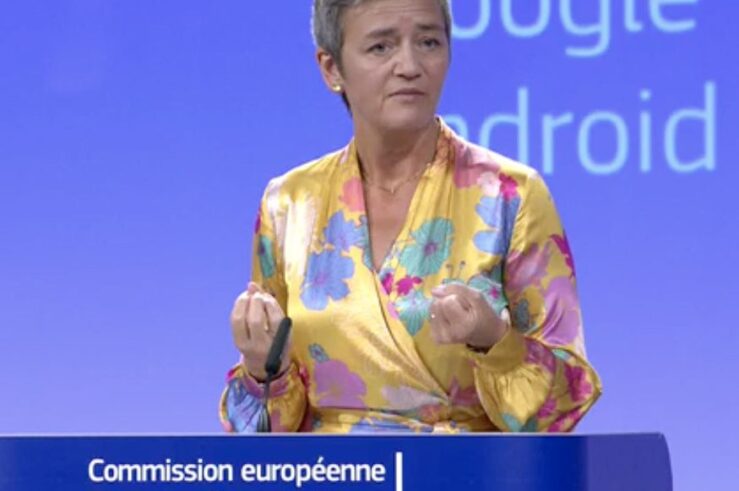Showing archive for: “EU”
The Amazon investigation and Europe’s “Big Tech” Crusade
The dust has barely settled on the European Commission’s record-breaking €4.3 Billion Google Android fine, but already the European Commission is gearing up for its next high-profile case. Last month, Margrethe Vestager dropped a competition bombshell: the European watchdog is looking into the behavior of Amazon. Should the Commission decide to move further with the ... The Amazon investigation and Europe’s “Big Tech” Crusade
Reflections on the recent filings in Qualcomm/FTC dispute
On Monday, the U.S. Federal Trade Commission and Qualcomm reportedly requested a 30 day delay to a preliminary ruling in their ongoing dispute over the terms of Qualcomm’s licensing agreements–indicating that they may seek a settlement. The dispute raises important issues regarding the scope of so-called FRAND (“fair reasonable and non-discriminatory”) commitments in the context ... Reflections on the recent filings in Qualcomm/FTC dispute
E-cigarette taxation: Lessons from “sin taxes”
The Economist takes on “sin taxes” in a recent article, “‘Sin’ taxes—eg, on tobacco—are less efficient than they look.” The article has several lessons for policy makers eyeing taxes on e-cigarettes and other vapor products. Historically, taxes had the key purpose of raising revenues. The “best” taxes would be on goods with few substitutes (i.e., ... E-cigarette taxation: Lessons from “sin taxes”
The European Commission’s Google Android decision takes a mistaken, ahistorical view of the smartphone market
What to make of Wednesday’s decision by the European Commission alleging that Google has engaged in anticompetitive behavior? In this post, I contrast the European Commission’s (EC) approach to competition policy with US antitrust, briefly explore the history of smartphones and then discuss the ruling. Asked about the EC’s decision the day it was announced, ... The European Commission’s Google Android decision takes a mistaken, ahistorical view of the smartphone market
Will the European Commission’s Google Android Decision Benefit Consumers?
By Pinar Akman, Professor of Law, University of Leeds* The European Commission’s decision in Google Android cuts a fine line between punishing a company for its success and punishing a company for falling afoul of the rules of the game. Which side of the line it actually falls on cannot be fully understood until the ... Will the European Commission’s Google Android Decision Benefit Consumers?
The EU’s Google Android antitrust decision falls prey to the nirvana fallacy
Today the European Commission launched its latest salvo against Google, issuing a decision in its three-year antitrust investigation into the company’s agreements for distribution of the Android mobile operating system. The massive fine levied by the Commission will dominate the headlines, but the underlying legal theory and proposed remedies are just as notable — and ... The EU’s Google Android antitrust decision falls prey to the nirvana fallacy
Why the EU’s Google Android Antitrust Fine May Harm R&D and Innovation
Regardless of which standard you want to apply to competition law – consumer welfare, total welfare, hipster, or redneck antitrust – it’s never good when competition/antitrust agencies are undermining innovation. Yet, this is precisely what the European Commission is doing. Today, the agency announced a €4.34 billion fine against Alphabet (Google). It represents more than ... Why the EU’s Google Android Antitrust Fine May Harm R&D and Innovation
Why the Commission’s Google Android decision harms competition and stifles innovation
Our story begins on the morning of January 9, 2007. Few people knew it at the time, but the world of wireless communications was about to change forever. Steve Jobs walked on stage wearing his usual turtleneck, and proceeded to reveal the iPhone. The rest, as they say, is history. The iPhone moved the wireless ... Why the Commission’s Google Android decision harms competition and stifles innovation
Will the European Commission Reduce the Incentive to Innovate?
The EC’s Android decision is expected sometime in the next couple of weeks. Current speculation is that the EC may issue a fine exceeding last year’s huge 2.4B EU fine for Google’s alleged antitrust violations related to the display of general search results. Based on the statement of objections (“SO”), I expect the Android decision ... Will the European Commission Reduce the Incentive to Innovate?
A preliminary assessment of the relative antitrust risk of a Comcast vs Disney purchase of 21st Century Fox assets
As has been rumored in the press for a few weeks, today Comcast announced it is considering making a renewed bid for a large chunk of Twenty-First Century Fox’s (Fox) assets. Fox is in the process of a significant reorganization, entailing primarily the sale of its international and non-television assets. Fox itself will continue, but ... A preliminary assessment of the relative antitrust risk of a Comcast vs Disney purchase of 21st Century Fox assets
Soylent Analytica: The Graph is too Damn Open
The world discovered something this past weekend that the world had already known: that what you say on the Internet stays on the Internet, spread intractably and untraceably through the tendrils of social media. I refer, of course, to the Cambridge Analytica/Facebook SNAFU (or just Situation Normal): the disclosure that Cambridge Analytica, a company used ... Soylent Analytica: The Graph is too Damn Open
Google’s India case and a return to consumer-focused antitrust
What happened Today, following a six year investigation into Google’s business practices in India, the Competition Commission of India (CCI) issued its ruling. Two things, in particular, are remarkable about the decision. First, while the CCI’s staff recommended a finding of liability on a litany of claims (the exact number is difficult to infer from ... Google’s India case and a return to consumer-focused antitrust






